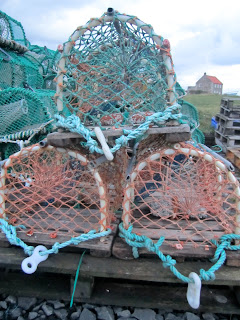X-ian
| Gospel | John 21:1-14 |
|---|
 |
| ebbing tide at Lindisfarne |
Jesus showed himself again to the disciples. It was by the Sea of Tiberias, and it happened like this: Simon Peter, Thomas called the Twin, Nathanael from Cana in Galilee, the sons of Zebedee and two more of his disciples were together. Simon Peter said, ‘I’m going fishing.’ They replied, ‘We’ll come with you.’ They went out and got into the boat but caught nothing that night.
It was light by now and there stood Jesus on the shore, though the disciples did not realise that it was Jesus. Jesus called out, ‘Have you caught anything, friends?’ And when they answered, ‘No’, he said, ‘Throw the net out to starboard and you’ll find something.’ So they dropped the net, and there were so many fish that they could not haul it in. The disciple Jesus loved said to Peter, ‘It is the Lord.’ At these words ‘It is the Lord’, Simon Peter, who had practically nothing on, wrapped his cloak round him and jumped into the water. The other disciples came on in the boat, towing the net and the fish; they were only about a hundred yards from land.
As soon as they came ashore they saw that there was some bread there, and a charcoal fire with fish cooking on it. Jesus said, ‘Bring some of the fish you have just caught.’ Simon Peter went aboard and dragged the net to the shore, full of big fish, one hundred and fifty-three of them; and in spite of there being so many the net was not broken. Jesus said to them, ‘Come and have breakfast.’ None of the disciples was bold enough to ask, ‘Who are you?’; they knew quite well it was the Lord. Jesus then stepped forward, took the bread and gave it to them, and the same with the fish. This was the third time that Jesus showed himself to the disciples after rising from the dead.
Given the Judaic practice of using mystical numbers to underpin story I have spent time in other years trying to work out what was so meaningful about one hundred and fifty three fish. This year I think I may have it - there is nothing meaningful about them - the meaningful part is the need to count them.
The benefit of the four Gospels is the four voices that tell the story; the problem is. if you are not careful, you mix them up and the meanings are lost. The stories may be similar but they are not the same - they have their own melody.
I don't know why but I had always assumed that Peter jumped into the water to get to Jesus first but this is not suggested at all. In fact Simon Peter is acting very much as I do when I am experiencing a feeling that he may well be feeling.
In John there are ways of 'seeing' from the superficial to the deep insights; grace-filled or transitory. The beloved disciple, being innocent and loyal sees ' knows' the Lord even at this distance. Simon Peter, feels Jesus' eyes on him and feels ashamed; he knows he is forever guilty of denying Jesus at the trial; he is not reconciled to what he has done. This big, strong man was Jesus' best friend yet look at what he did, couldn't save him; wasn't even at the foot of the cross. What must Jesus think of him? So, like Adam in the garden, he grabs his clothes and hides away; going into the water; into his element, so as not to deal with the excitement of the others; knowing that his joy is tempered by another emotion - shame.
When the rest of the disciples finally come ashore, Simon Peter goes back onto his boat; the one place where he is still in charge, lets the other disciples disembark and takes over all responsibility for the catch -this is what he is good at; this where he can prove himself.
Eventually, however, he must come onto dry land nearer and nearer to his Lord, but there is still an opportunity to prevaricate - 'let's count the fish'. Like tidying the cutlery drawer, putting all the books on the bookshelves into alphabetical order or sorting out the recycling - anything; anything other than look his friend in the eye and deal with what has gone before; however long it takes to count to one hundred and fifty three.
And yet, what is it that he is avoiding? A warm and ready welcome; hospitality; an invitation to be fed. No accusation; no exclusion; no judgment - but too hard to believe?
He who takes away the sins of the world begins as he means to go on - it is us who find it hard to believe.
Litany for the Unworthy
wordinthehand2011
Given the Judaic practice of using mystical numbers to underpin story I have spent time in other years trying to work out what was so meaningful about one hundred and fifty three fish. This year I think I may have it - there is nothing meaningful about them - the meaningful part is the need to count them.
The benefit of the four Gospels is the four voices that tell the story; the problem is. if you are not careful, you mix them up and the meanings are lost. The stories may be similar but they are not the same - they have their own melody.
I don't know why but I had always assumed that Peter jumped into the water to get to Jesus first but this is not suggested at all. In fact Simon Peter is acting very much as I do when I am experiencing a feeling that he may well be feeling.
In John there are ways of 'seeing' from the superficial to the deep insights; grace-filled or transitory. The beloved disciple, being innocent and loyal sees ' knows' the Lord even at this distance. Simon Peter, feels Jesus' eyes on him and feels ashamed; he knows he is forever guilty of denying Jesus at the trial; he is not reconciled to what he has done. This big, strong man was Jesus' best friend yet look at what he did, couldn't save him; wasn't even at the foot of the cross. What must Jesus think of him? So, like Adam in the garden, he grabs his clothes and hides away; going into the water; into his element, so as not to deal with the excitement of the others; knowing that his joy is tempered by another emotion - shame.
When the rest of the disciples finally come ashore, Simon Peter goes back onto his boat; the one place where he is still in charge, lets the other disciples disembark and takes over all responsibility for the catch -this is what he is good at; this where he can prove himself.
Eventually, however, he must come onto dry land nearer and nearer to his Lord, but there is still an opportunity to prevaricate - 'let's count the fish'. Like tidying the cutlery drawer, putting all the books on the bookshelves into alphabetical order or sorting out the recycling - anything; anything other than look his friend in the eye and deal with what has gone before; however long it takes to count to one hundred and fifty three.
And yet, what is it that he is avoiding? A warm and ready welcome; hospitality; an invitation to be fed. No accusation; no exclusion; no judgment - but too hard to believe?
He who takes away the sins of the world begins as he means to go on - it is us who find it hard to believe.
Litany for the Unworthy
Lamb of God who takes away the sin of the world
have mercy on us
We who demand to be fed
We who listen but do not understand
We who would have followed the crowd
We who would have ran away
We who have the answers
We who do not show mercy
We who do not say thank you
We who know better
We who define you
We who can only go so far
We who betray you
We who cage you
We who do not see you
We who love you
Have mercy on us
And let our hearts be broken
Let our hearts be broken
By your generosity of your love
By the humility and obedience of your kingship
By the injustice and cruelty of your sacrifice
By the knowledge of your innocence
Let our hearts be broken
so that through our wounds
so that through our wounds
you may enter
And take away our sin
Amen
wordinthehand2011





Comments
I like the reason you gave about the number of fish; I hadn't seen it that way before.
Litany for the Unworthy is very powerful.